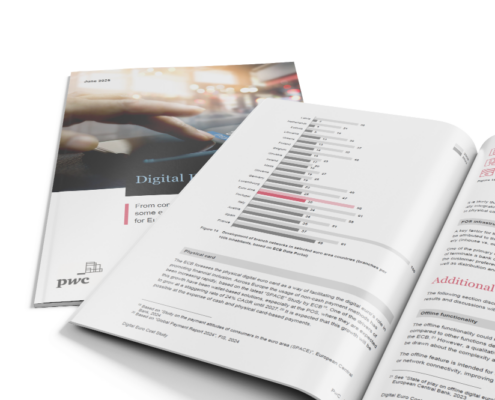Digital Euro Cost Study
Banking sector studies costs for digital euro implementation
Brussels, 5 June 2025 – The European Association of Co-operative Banks (EACB), the European Banking Federation (EBF) and the European Savings and Retail Banking Group (ESBG) commissioned a study to PricewaterhouseCoopers (PwC) with the objective to provide a first estimate of investments banks would need to make for the introduction of a retail digital euro.
The study analyses the anticipated costs and resource requirements for euro area banks associated with the introduction of a digital euro for an initial period of 4 years. It also looks at what are the main cost drivers and key implementation challenges. It is based on a survey among 19 European retail banks, the data of which were collected in an anonymised way, working on a commonly elaborated set of assumptions, and the current available version of the Digital Euro Rulebook. The scope of the study excludes estimates for an offline functionality, multiple accounts and running costs for the digital euro once implemented. It is therefore to be read as an initial approximation of a part of the total costs of implementing a digital euro as currently proposed.
Key findings of the Digital Euro Cost Study:
- Operational challenges: Approximately 75% of total costs are estimated to be attributed to technical adaptations. Examples of such costs include updates to mobile banking applications, integration of the digital euro physical card, and upgrades to ATM, branch and POS infrastructures. Furthermore, it is anticipated that a considerable part of banks’ relevant skilled resources may be allocated annually to the digital euro implementation. This is expected to pose significant constraints to their capacity to develop own innovation initiatives, and ensure compliance with the constantly evolving regulatory framework.
- Estimated costs: Participating banks would face initial costs estimated to exceed 2 billion euro, with an average outlay of 110 million euro per bank. When extrapolated to the entire euro area, total change costs could reach 18 billion euro. Importantly, as design, expectations and technological requirements are still work in progress, the study does not include running costs, as well as costs for the acquiring processing and those linked to the offline functionality and multiple accounts.
- Cost-efficiency and sustainability: To ensure long-term viability, and considering the broad impact of the digital euro, the total cost must be significantly reduced. The design and implementation of digital euro requirements should provide banks with the flexibility to adapt based on their own existing client interfaces and local market expectations, while leveraging existing infrastructure and industry standards to enhance efficiency.
The study provides insights into the important financial and operational implications that the potential introduction of a digital euro would entail, as a contribution to the ongoing policy dialogue. Should a decision be made to move forward, it will be critical that any implementation is grounded in cost-efficiency, long-term sustainability, and a fair compensation model.
A thorough cost-benefit analysis will be essential to evaluate the digital euro’s potential impact and to ensure that its objectives are met without compromising innovation or the competitive dynamics of the European banking sector. Banks are committed to continue the constructive dialogues with all relevant stakeholders to ensure a digital euro is being developed which is attractive to all interested parties.
x
For more information please contact:
Rūta Barthet
Senior Media and Communications Manager, r.barthet@ebf.eu
About the EBF:
The European Banking Federation is the voice of the European banking sector, bringing together 32 national banking associations in Europe that together represent a significant majority of all banking assets in Europe, with 3,500 banks – large and small, wholesale and retail, local and international – while employing approximately two million people. EBF members represent banks that make available loans to the European economy in excess of €20 trillion and that reliably handle more than 400 million payment transactions per day. Launched in 1960, the EBF is committed to a single market for financial services in the European Union and to supporting policies that foster economic growth.

